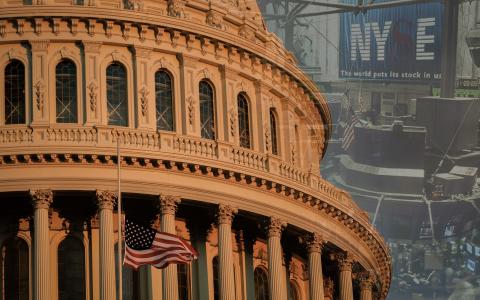
(Yahoo!Finance) - The debt ceiling debate isn’t worrying Wall Street yet. In Bank of America’s latest fund manager survey, 71% of investors said they expect a debt ceiling resolution before the “X-Date.”
The survey conducted from May 5-11 showed a 9-percentage-point drop in confidence from a month prior that the U.S. will reach a resolution despite Treasury Secretary Janet Yellen recently circling June 1 as the date the U.S. may no longer be able to pay its obligations.
When asked in the survey what the biggest tail risks facing markets are, the U.S. debt ceiling was at the bottom of the top five answers, representing 8% of responses. A “bank credit crunch & global recession,” topped concerns with roughly 1-out-of-3 respondents focused there.
President Joe Biden and Speaker of the House Kevin McCarthy met last week and resumed discussions on Monday. But it appears little progress toward a deal has been made.
“I don’t think we’re in a good place,” McCarthy said on Monday.
Yellen warned in a speech on Tuesday that “it is very conceivable that we’d see a number of financial markets break" if a deal isn’t made. But that concern hasn’t played out in markets yet.
The S&P 500 has been trading in a range of 3,800-4,200 for seven months and is largely unchanged since the start of first-quarter earnings.
The fear for investors is that the crisis isn’t resolved by June 1 and therefore puts pressure on markets that are already worried about banking turmoil, sticky inflation and the Federal reserve’s next decision on interest rates.
Prior research from BofA indicates that markets don’t usually react to debt ceiling concerns until two weeks prior to the X Date. That would start in earnest on Thursday.
If history is an indicator, then some volatility and eventual move to the downside could be in store. In a note to clients on Monday, RBC Capital’s Lori Calvasina noted that when the debt ceiling crisis comes along with other stresses in markets, the S&P 500 has nose dived in a range from 10-19%.
In 2011, a year that matches the current political structure, markets rallied to start the year. But once debt ceiling concerns carried into the summer the S&P 500 tanked, falling nearly 20% peak-to-trough leading into the August 2, 2011 X-Date.
"EVR ISI Strategy expects any debt ceiling extension is likely to come in response to market pain rather than to prevent," Julian Emmanuel, who leads Evercore ISI's Equity and Portfolio strategy in a note to clients. "For investors’ and the credit rating of the U.S., the best outcome in the short term (however unappealing long term) may well be “shattering the months’ long ceiling”.
By Josh Schafer · Reporter
Josh is a reporter for Yahoo Finance.



